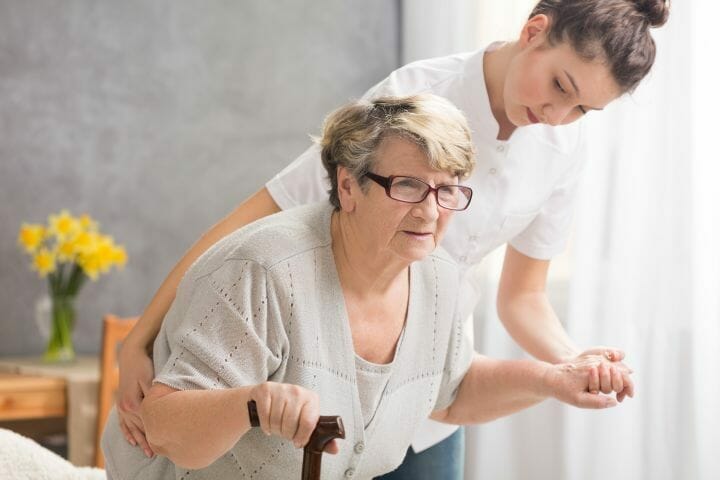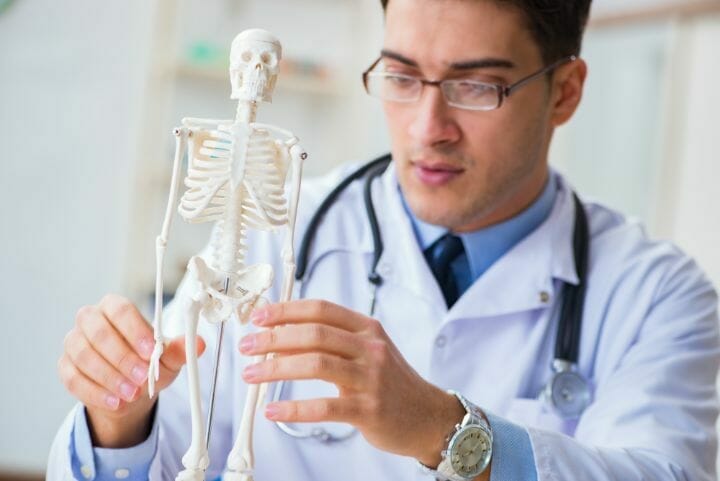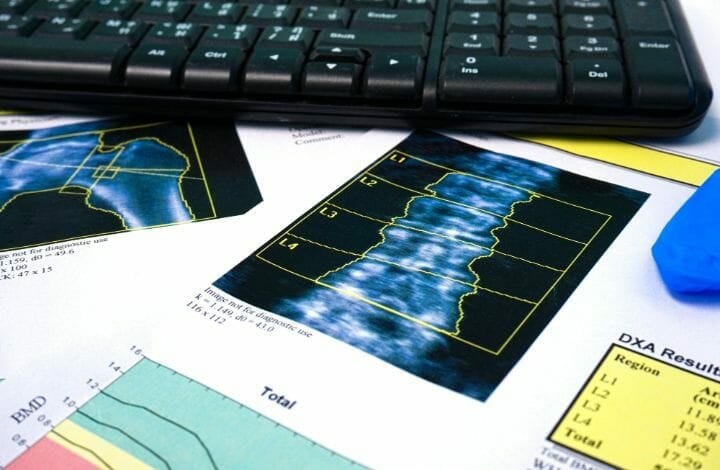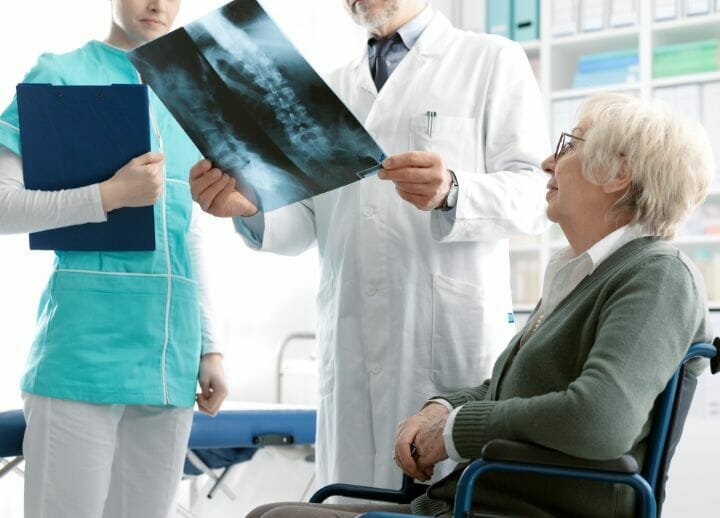What is Osteoporosis?
Osteoporosis is a condition that causes bone health to deteriorate, resulting in weak, porous bone. The bone density decreases and fractures risk increases, and in severe cases of osteoporosis, even mild stress like coughing, or bending over can cause bone fracture.
Contents
Osteoporosis causes hip fracture and osteoporotic fracture in the lower back and spine and it is hard for the elderly to live well with severe osteoporosis.
A bone is made up of living tissues that are constantly broken and replaced. Bones go through a state of constant renewal. In case of an osteoporotic fracture, bone tissues do not get replaced with a new bone. Here, the pace of new bone formation significantly declines. On the other hand loss of old bone occurs as usual.
Many studies say that osteoporosis is more likely to occur in older females than males, hence the fracture risk is more in older females. Bone loss or porous bones is a major issue for females above the age of 30.
The onset of bone loss is earlier in women because they reach their peak bone mass in their early 20’s compared to the late ’20s in men. Insufficient calcium and vitamin D intake could also a contributing factor to weak bones. This is the reason why doctors generally advise women in their thirties to take supplements for osteoporosis management.
Several medications, weight-bearing exercises, and a healthy diet plan for osteoporosis can lower chances of bone loss and low bone density, eliminating the risk of weak bones and bone fracture.
A balanced diet can repair porous bone, strengthen weak bones, and improve low bone mass. Also, to lower the risk factor of a broken bone, we recommend that you get a bone density test at regular intervals.
Now, stronger bones do mean better bone health. But, about 90% of peak bone mass is acquired by age 18 in girls and age 20 in boys. For optimal bone mass and bone strength, it is essential that kids in their preteens focus on a healthy lifestyle.
This can help avert bone loss or low bone mass. Building bone strength early in life reduces the risk of hip fracture, spinal fracture, or any other kind of bone fracture that can take place in older men or in a postmenopausal woman.
Osteoporotic treatments in the advanced stages require you to take an osteoporosis drug along with a calcium supplement.
We know that osteoporosis affects the formation and maintenance of a healthy bone. We also know that fragility fractures while having low bone density cannot be taken lightly. Read more on interesting facts about osteoporosis here.
Can You Die from Osteoporosis?
Osteoporosis is often referred to as a ‘silent killer’. This is because many people do not realize that they have problems with bone mineral density and osteopenia until by accident. It could be a fracture like a spinal fracture or any other kind of bone fracture after which the diagnosis tells them that they have a spongy bone disorder.
Osteoporosis isn’t life-threatening in the early stages. But poor bone health and inability to produce bone tissues puts the patient in a state of ever-increasing risk.
This bone disease won’t kill on its own but its effects can. Complications from any osteoporotic bone fracture can cause death. Fracture in the thigh bone or a vertebral compression fracture can cause serious issues to overall health in the body. These complications make the management of osteoporosis in the elderly difficult.
But other than osteoporosis medication and osteoporosis drugs, weight-bearing exercises can help. It is necessary to maintain the right bone mineral density with the right nutritionally balanced diet. Dexa scan, which means a dual-energy x-ray can give a clear picture of the mineral density in each bone.
Symptoms of Osteoporosis
There are practically no severe symptoms in the early stages of deteriorating bone health or low bone density. But once you start losing your bone strength, you might get slight symptoms such as:
- Back pain
- Vertebral fracture, hip fracture, spinal fracture due to basic injuries
- Loss of height over time
- A stooped posture
- Broken bone or fracture from a not-so-severe injury or accident
- Lower bone strength proved from bone density test
Also, another kind of fracture that is common among humans with osteoporosis is vertebral compression fracture. It is caused by a loss of bone mass that weakens the spine. Compression fractures occur as a part of aging.
You may also like Best Weighted Vest for Osteoporosis
How is Osteoporosis Diagnosed?
A bone density scan can offer information about the bone mass and overall bone health. Bone mineral density tests, also known as dual-energy X-ray absorptiometry (DEXA scan) scans are done to get a clear picture of the situation. These X-rays use very small amounts of radiation to determine bone health.
All women over the age of 65 should get a bone density test. We recommend that women who are at a higher risk for osteoporosis get a DEXA Scan earlier. Men over age 70, or younger men with risk factors, should also consider getting a bone density test.
Risk Factors of Osteoporosis
Often some people are more at risk for osteoporosis than others.
- BMI: Underweight women are more at risk because of their lower mineral density affecting healthy bone formation.
- Family History: A family history of osteoporosis also increases your risk factor of developing the disease. Women who are currently dealing with or have a history of an eating disorder such as anorexia or bulimia are more likely to have osteoporosis-induced fragility fracture. Chronic dieters may have missed out on some nutrients over years of food restrictions.
- Tobacco and Caffeine: Smoking can cause osteoporosis or worsen the effects if you already suffer from the disease. Smoking and excess caffeine, lack of a nutritious diet, and exercise can trigger osteopenia. They are often treated with regular calcium supplements. Often, we see a deficiency of parathyroid hormones in these patients too. Parathyroid hormones will help in regulating the concentration of serum calcium by showing the hormonal effect on bones. Long-term imbalance of the parathyroid hormone can weaken healthy bones.
- Rheumatoid arthritis: Patients with rheumatoid arthritis have a stronger risk of osteopenia as these patients lose the ability of bone formation. Rheumatoid arthritis is a chronic disorder that causes inflammation in joints, including those in the hands and feet.
- Menopause: The most common cause of osteoporosis in women is the decrease in estrogen levels during menopause, leading to a significant increase in bone mass turnover and subsequent imbalance between bone formation and resorption. This imbalance leads to continuous loss of bone mineral density.
These patients do not have strong bones due to the weakening of the joints. Low-impact weight-bearing exercises or water exercises can also help them prevent any spinal fracture, vertebral fracture, or any other kind of fragility fracture. Like osteoporosis, rheumatoid arthritis is also not life-threatening on its own but, it can give birth to complications that can be.
Let’s list down some other medications or medical conditions that can increase the risk of osteoporosis.
- Irregular levels of parathyroid hormone
- History of bariatric (weight loss) surgery or organ transplant
- Hormone treatment for breast or prostate cancer or a history of missed periods
- Celiac disease or inflammatory bowel disease
- Blood diseases such as multiple myeloma
- Medications for treating seizures
You may also like Do Elderly Know When They Are Dying
Does Osteoporosis Cause Death?
Osteoporosis can significantly impact the quality of life, ranging in severity from lifestyle disruption to hospital visits and even death.
Proper preventive care and treatment can help reduce osteoporosis complications
Osteoporosis Treatment to Reduce Fatality Risk
Treatment for osteoporosis includes several weight-bearing exercises, vitamin and mineral supplements. These exercises for bone health and a nutrition-packed diet are often advised to prevent the onset of osteopenia. They can boost the formation of new bones and help you maintain bone mass. Avoid an acidic diet such as apple cider vinegar and prolonged fasting as this accelerates the risk for osteoporosis.
Osteoporosis treatment includes osteoporosis medication and various hormone and hormone-related therapies. These include estrogen, testosterone, and the selective estrogen receptor modulator raloxifene.
Bisphosphonates: Bisphosphonate is used widely in osteoporosis treatments as they slow down bone resorption rate. You may be able to stop taking bisphosphonates after three to five years and still get benefits after you stop.
Strontium ranelate: An osteoporosis drug commonly used to treat postmenopausal women and older men with spongy bone disorder. Strontium ranelate consisting of the organic component (ranelic acid) with two strontium atoms attached to it, increases bone formation and decreases bone resorption.
You may also like Aerobic Exercises for Seniors
Conclusion
If you are still wondering “is osteoporosis fatal?”, know that death caused by osteoporosis is mostly due to the complications that arise after a hip fracture or spine fracture in the elderly. Around 60 percent of elderly adults who have brittle bones and spongy bone disorder do not survive the complications caused by a hip fracture or a thigh bone fracture. Spinal fractures such as vertebral compression fractures are also quite untreatable.
Osteoporosis, in the beginning, will strip the calcium off from the bones and in a higher stage, will bend and collapse the spine. It can lead to unremitting pain, shattered hips, incapacitating fear, and also death.
The good news is that there are certain preventive measures you can take to prevent the onset of osteoporosis. It can also be treated with supplementation and a healthy diet plan. Weight-bearing exercise and Yoga are good for osteoporosis.




